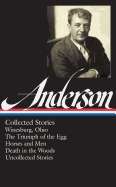Collected Stories: Winesburg, Ohio / The Triumph of the Egg / Horses and Men / Death in the Woods / Uncollected

Editorial Library Of America
Fecha de edición diciembre 2012 · Edición nº 1
Idioma inglés
EAN 9781598532043
928 páginas
Libro
encuadernado en tapa dura
Resumen del libro
In the winter of 1912, Sherwood Anderson (1876-1941) abruptly left his office and spent three days wandering through the Ohio countryside, a victim of "nervous exhaustion." Over the next few years, abandoning his family and his business, he resolved to become a writer. Novels and poetry followed, but it was with the story collection "Winesburg, Ohio "that he found his ideal form, remaking the American short story for the modern era. Hart Crane, one of the first to recognize Anderson's genius, quickly hailed his accomplishment: "America should read this book on her knees." Here--for the first time in a single volume--are all the collections Anderson published during his lifetime: "Winesburg, Ohio "(1919), "The Triumph of""the Egg "(1921), "Horses and Men "(1923), and "Death in the""Woods "(1933), along with a generous selection of stories left uncollected or unpublished at his death. Exploring the hidden recesses of small town life, these haunting, understated, often sexually frank stories pivot on seemingly quiet moments when lives change, futures are recast, and pasts come to reckon. They transformed the tone of American storytelling, inspiring writers like Hemingway, Faulkner, and Mailer, and defining a tradition of midwestern fiction that includes Charles Baxter, editor of this volume.
Biografía del autor
Sherwood Anderson (Camden, Ohio, 1871 x{0026} x02013; Colón, Panamá, 1941) fue un escritor y periodista estadounidense encuadrado dentro de la denominada como 'Generación perdida'. Conocido principalmente por su obra 'Winesburg, Ohio', tuvo un papel determinante en el desarrollo de la narrativa norteamericana de principios del siglo xx, por su rol como maestro y mentor de William Faulkner. Su curiosa biografía explica a la perfección las inquietudes reflejadas en su obra. Crítico observador de su entorno, en su faceta menos conocida como periodista se dedicó a censurar con vehemencia las consecuencias de la industrialización sobre las personas, así como el paso de una vida ligada a la naturaleza a otra completamente desnaturalizada.








